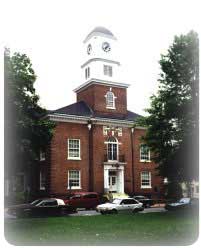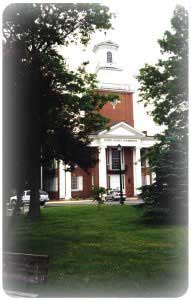History

Although Delaware's present Court of Common Pleas is a creation of the twentieth century, its lineage, at least in name, is ancient and noble. In 1178, Henry II established a Common Pleas Court as an appendage to the Curia Regis (King's Court) to hear "pleas" or suits between individuals, as distinguished from litigation in which the Crown was a party. Magna Carta, in 1215, decreed that common pleas ("communia placita") be heard at a fixed location (Westminster) rather than follow the King, thus granting it some measure of independence. Until dissolved by the Judicature Act of 1873, the Court of Common Pleas, together with the King's Bench and the Court of Exchequer, defined England's common law tradition.
Common Pleas Courts were established in Pennsylvania's three lower counties (now Delaware ) during the colonial period, and the Delaware Constitution of 1792 continued their existence in the Delaware State for a few decades. These, however, were courts of general civil jurisdiction and, as such, the antecedents of the present Superior Court.
The history of today's Court of Common Pleas begins in April of 1917 with legislation creating "The Court of Common Pleas for New Castle County." The court commenced its first term on May 1 in the then-new County and Municipal Building, followed by the renaming of the building to the Daniel L. Herrmann Courthouse. In 2002, the Court of Common Pleas for New Castle County moved to the newly constructed New Castle County Courthouse in Wilmington. Like Henry II's communia placita, established some seven hundred years earlier, Delaware 's new Court of Common Pleas was little more than an appendage to an existing court, in this case the Superior Court. Its intended purpose was to relieve the Superior Court in New Castle County of a backlog of civil cases by diverting suits in which the amount in controversy was less than five hundred dollars. Jury trials were available but not encouraged; the demanding party was required "to give security to pay for the expense incurred thereby." Juries were limited to no more than five jurors, and the verdict was had by majority vote (hence, no hung juries).
The new court was also given criminal jurisdiction, but of a curious kind. The court had no jurisdiction to try criminal cases, no matter how minor the offense; however, it had the authority to receive guilty pleas and impose sentences for any crime, felony or misdemeanor that fell under the jurisdiction of the Court of General Sessions, at that time Delaware's court of general, non-capital criminal jurisdiction.
Another curiosity deserves mention. Although the enabling act provided for the employment of a clerk and a "crier," it did not provide for the employment of a judge. Rather, the new court was to be presided over by one of the judges of the Superior Court, who would receive ten dollars per diem for such services. At the time, however, this was not as odd as it might seem today. In Delaware there were then six courts (excluding Municipal Court) over which lawyer judges presided: the Supreme Court, Superior Court, Court of General Sessions, Court of Oyer and Terminer, Court of Chancery and Orphans' Court. Statewide, however, there were only six judges: a chief justice, a chancellor, and four associate judges. Consequently, each of the six judges sat on several courts, as many as five (six with the addition of Common Pleas) and never fewer than three.
It is to Kent County that one must turn to find the first truly independent and, to today's practitioner, familiar Court of Common Pleas. The 1931 enabling act provided for civil jurisdiction up to one thousand dollars, misdemeanor criminal jurisdiction and transfer of criminal cases from Justice of the Peace Court to Common Pleas for trial. But perhaps the most important provision of the 1931 act was the creation of a Kent County Court of Common Pleas judgeship.
The Kent County experiment must have been a success, for in 1935 the General Assembly enacted legislation conforming the New Castle County Court of Common Pleas to the Kent County model, including the creation of a judgeship.
It was not until 1953 that the General Assembly enacted legislation creating a Court of Common Pleas for Sussex County. Although the enabling act, 49 Del. Laws Chapter 291, patterned the Sussex County Court after its Kent and New Castle County predecessors, there was a significant innovation. At this time, the Kent and New Castle County judgeships were "part-time" positions, which meant that the judges of those courts could maintain private law practices while sitting on the bench. The Sussex County judgeship, however, was designated a full-time position.
In 1962 jury trials in criminal cases were authorized in Kent and Sussex Counties, with jurors to be drawn from the Superior Court panel. In addition, these courts were required to maintain stenographic records of the proceedings. As a consequence, beginning in 1962 appeals from the Kent and Sussex Courts to the Superior Court were, for the first time, reviewed on the record.
In 1969 the New Castle County Court was also required to maintain a stenographic record; however, the New Castle County Court had never held jury trials of any kind. Because of the high volume of cases in New Castle County, it was deemed more expedient that jury trials be conducted in the Superior Court.
Prior to 1969, the Courts of Common Pleas were funded and operated by county governments. In July of 1969, legislation was enacted to allow the State to take over the courts. In 1973, the three courts were merged into one statewide Court of Common Pleas, and Robert H. Wahl became the Court's first Chief Judge.
Change continued throughout the 1970's. In 1976, the court in New Castle County employed pre-sentence investigators for the first time, enabling the court to secure pre-sentence investigations much more expeditiously and greatly decreasing the delay between trial and sentencing. In 1978, the court was given jurisdiction over preliminary hearings in felony cases. More than five thousand preliminary hearing cases were filed with the court during the first full year.
The court's caseload has grown rapidly over the years, in part as a result of significant changes in the Court's jurisdiction. In 1995, responding to recommendations of the Delaware Courts 2000 Commission, which envisioned an expanded and strengthened Court of Common Pleas as vital to the Delaware Court system, the General Assembly enlarged the Court's jurisdiction in a number of areas. Among other changes, the Court's civil jurisdiction increased from $15,000 to $50,000 (On Oct. 21, 2019 that limit was raised to $75,000.); the Court assumed civil and criminal appellate jurisdiction, as well as appellate jurisdiction over administrative appeals from the Division of Motor Vehicles; and the right to jury trial in criminal cases was extended to the Court in New Castle County.
At around the same time, in order to better manage its growing caseload, the Court adopted a number of case management techniques, e.g., the use of Case Review calendars, Pre-Trial Conferences, and the establishment of specialized Trial calendars. These efforts served to dispose of matters earlier in the process, allowing the Court to better focus its resources. However, the dramatically increasing caseload in the 1990's made it more difficult for the Court to keep pace and it began to experience a growing backlog. From 1971, when the court first had four full-time judges, until 1999, the number of cases filed annually in the Court of Common Pleas grew from five thousand to one hundred thirty-seven thousand.
Criminal arraignments are now conducted in large afternoon sessions, in which the majority of the defendants enter pleas of not guilty by a written plea that is prepared outside the court. Only those who wish to plead guilty are brought before a judge.
Criminal trials, once scheduled just two days a week, are now heard daily. Typically, as many as fifty defendants are scheduled for trial each day, although usually only two or three trials are actually held. In New Castle County, charges of Driving Under the Influence, once part of the regular criminal trial calendar, are now treated as a separate caseload. The court receives about 1,500 such cases each year with about 150 resulting in trials. Due to mandatory minimum sentences for second offenders, such cases are vigorously defended and consume much of the court's time.
Likewise, No Insurance and License Suspension charges, Domestic Violence cases, and Defendants requesting Jury Trials are handled on specialized calendars. The Court also established specialized calendars for drug cases as well as a successful drug diversion program in July of 1998.
Over the last twenty-five years, there have been various proposals to merge or to consolidate the Court of Common Pleas with other courts, both with the Superior Court and the Municipal Court of the City of Wilmington. Each time the proposals met with opposition. With regard to merger with the Superior Court, such proposals were initially opposed by the Common Pleas Judges. In later years, when it became apparent that such a merger would involve the consolidation of the large Common Pleas caseload into the Superior Court, such proposals were opposed by the Superior Court. The recommendations of the Delaware Courts 2000 Commission, along with the significant changes to the Court's jurisdiction in 1995, put an end to talk of consolidation of the Superior Court and the Court of Common Pleas for some time.
However, discussions continued regarding the Municipal Court and that merger finally did take place on May 1, 1998. On that date, the Municipal Court of the City of Wilmington was merged into the Court of Common Pleas, marrying two courts with like criminal jurisdiction and, for the first time, creating a truly statewide Court of Common Pleas.
The merger brought two additional Judges to the Court as well as a large caseload. Within a few months of the merger, the Court's New Castle County caseload doubled, creating a significant backlog in the Court.
Learn the history of the former Municipal Court of Wilmington
Judges
To date there have been twenty Common Pleas judges in the three counties: seven in Kent, nine in New Castle and four in Sussex. Although it is beyond the scope of this brief history to detail the biographies of these distinguished jurists, some mention of their identities and accomplishments must be made.
Kent County
The first Court of Common Pleas judge, appointed in 1931, was Earle Dukes Willey. Born in Greenwood in 1889, Earle Willey graduated from Dickinson College and served as principal of Greenwood High School from 1911 to 1915. He did not attend law school but, as was common practice at the time, read law under the tutelage of a practitioner, Dover attorney Henry R. Johnson. Admitted to the bar in 1920, he served as deputy attorney general for Kent County until his appointment to the bench in 1931. Judge Willey served as Kent County Common Pleas judge and also, beginning in 1933, as judge of the newly created Juvenile Court of Kent and Sussex Counties until 1939. After stepping down from the bench, he continued to serve the public in various capacities, including as secretary of state under Governor Bacon and as representative to the United States Congress from 1942 to 1944. Judge Willey died in Dover in 1950.
John P. LeFevre (1867-1975) followed Judge Willey, serving on the court's bench from 1939 to 1943. Born in Pennsylvania, Judge LeFevre moved to Dover in 1897 and read law under Henry R. Johnson (as did Judge Willey) and James H. Hughes. He served as deputy clerk of the Delaware Supreme Court from 1908 to 1913 when he was admitted to the bar. He and his brother Charles maintained an office on The Green. Judge LeFevre is remembered not only as a jurist, but also as a soldier. He joined the Delaware National Guard in 1908 and, in 1916, found himself patrolling the Mexican border on the lookout for Pancho Villa. The following year the United States declared war on Germany, and in 1918 Judge LeFevre with the Guard's 59th Pioneer Division shipped out for "over there." As battalion leader, he took part in the final great offensive of the war, the Meuse-Argonne. Judge LeFevre served as the Guard's commanding officer from 1923 until 1932.

Ernest V. Keith, brother of Wilmington attorney Thomas Muncy Keith, followed Judge LeFevre as Kent County 's third Common Pleas judge. Judge Keith served two terms, from 1943 to 1951 and from 1957 to 1961. Born in Dover in 1903, he was stricken with polio as a child and confined to a wheelchair, a circumstance that did not deter him from pursuing a life of distinguished public service. He received his legal education through correspondence courses, certainly a Delaware singularity, and was admitted to the bar in 1926. An advocate of a statewide Family Court, Judge Keith was instrumental in establishing a Juvenile Court to serve Kent and Sussex Counties in 1933, and he served on that court in addition to his Common Pleas duties.
Dover attorney Arley B. "Ben" Magee, Jr. succeeded Judge Keith to the Common Pleas bench. Born in 1900, Judge Magee was admitted to the bar in 1925, practiced law at first with his father and served as Dover city solicitor. He was defense counsel in the notorious "Lonely Hearts" murder case. Judge Magee died suddenly of a heart attack in the courthouse on October 23, 1956. He was succeeded, albeit briefly, by David P. Buckson, who left the Common Pleas bench shortly after being elected lieutenant governor under J. Caleb Boggs.
Judge Buckson also served as governor for a few weeks in 1961 when Governor Boggs resigned to assume his position as newly elected United States senator. Judge Buckson went on to serve the people of Delaware as attorney general for eight years and for a twelve-year term as a judge of the Family Court. He lives in Dover.
Ernest Keith returned to the Common Pleas bench and served from 1957 to 1961. He was succeeded by William G. Bush, III, whose father was a probation officer in the Juvenile Court of Kent and Sussex Counties that Judge Keith had been instrumental in founding. A veteran of World War II (Army and Navy), Judge Bush graduated from the University of Delaware in 1949 and went to Florida to take up farming. He was wiped out by a hurricane. Accepting this as a sign that farming was not to be his vocation, Judge Bush attended law school at the University of Miami and then returned to Dover where he clerked under Charles L. Terry, Jr., and was admitted to the bar in 1955. Judge Bush was the first full-time Kent County Common Pleas judge, and during his tenure the court became a court of record and began conducting jury trials. In 1972, Judge Bush was appointed to the Superior Court where he completed a distinguished career. Merrill C. Trader, who continues to sit on the court's bench to this day, followed Judge Bush.
In 2000, the General Assembly authorized a second judgeship for Kent County, and Charles W. Welch, III was nominated and confirmed as an associate judge.
Sussex County

If Kent County has had the most Common Pleas judges, Sussex County has had the fewest – four. The Sussex County court's first judge was Isaac D. Short, II, appointed in 1953. Judge Short received his legal education at the University of Pennsylvania and was admitted to the bar in 1932. He served both as Levy Court attorney and attorney for the General Assembly before being appointed to the bench. Judge Short served as the Sussex court's judge until 1961 when he was appointed vice-chancellor in the Court of Chancery, where he completed a distinguished legal career.
Following Judge Short's appointment to Chancery Court in 1961, the Common Pleas bench was occupied by Lawrence C. Elliott. Born on a farm near Bridgeville, Judge Elliott graduated from the University of Delaware and Yale Law School and was admitted to the bar in 1934. He practiced law in Georgetown until his appointment to the bench in April of 1961. Judge Elliott served a full twelve-year term on the court, retiring in 1973. He died of a heart attack in December of 1975. Judge Elliott was succeeded by Paul E. Ellis, who retired from the bench after 23 years of service in 1996.
Richard F. Stokes was nominated and confirmed as an associate judge for Sussex County in 1996 and served until appointed to the Sussex County Superior Court Bench in 1999. He was succeeded by Rosemary Betts Beauregard, who became the first woman to serve as a Court of Common Pleas Judge.
Like Kent County, in 2000 the General Assembly authorized an additional judgeship for Sussex County, and Kenneth S. Clark, Jr., was nominated and confirmed as an associate judge.
New Castle County
The first New Castle County Common Pleas judge, appointed in 1935, was Leonard E. Wales, who was born in Wilmington in 1870 to an illustrious Delaware family dedicated for generations to public service. His grandfather, John Wales, had served as United States senator; his father, John Patton Wales, was mayor of Wilmington; and his uncle, after whom he was named, had been the fifth judge of the United States District Court for the District of Delaware. Leonard Wales read law under the tutelage of his uncle, attended law school at the University of Pennsylvania and, after further reading law in the Wilmington office of Hoffecker & Hoffecker, was admitted to the bar in 1894. Like his uncle, Judge Wales spent much of his legal career in District court, first as referee in bankruptcy, a position he held for twelve years, and then as United States attorney from 1927 to 1935. A "Signer's Day" address delivered to an audience of several thousand on July 2, 1926 provides insight into Wales' character and beliefs. He began his address by blaming Prohibition, which he regarded as wholly unenforceable, for fostering widespread disrespect for the law. He then turned to citizenship (a word rarely heard today), about which he had this to say: "The true test of citizenship is how the citizen meets his duties and obligations, not how he enjoys his privileges." Judge Wales sat on the Common Pleas Court 's bench from 1935 until his death in 1943.
The colorful Percy Warren Green was appointed to the Common Pleas bench following Leonard Wales' death. Born in Booth's Corner, Pennsylvania in 1889, Judge Green graduated from Wilmington High School in 1907 and the University of Pennsylvania in 1911. After a brief stint as assistant professor of finance at Washington State College, he returned to Wilmington and read law under William S. Hilles. He was admitted to the bar in 1916. Because he had no formal legal education, he referred to himself as a "hatchet and saw" lawyer; however, of his mentor he had nothing but highest praise: "Mr. Hilles on one side of a table and a pupil on the other side constituted a university." Before his appointment to the court's bench, Green served the people of Delaware in a number of positions, including attorney general from 1933 to 1939, and deputy Municipal Court judge from 1941 to 1943. Green was an amateur Delaware historian and an avid, some might say compulsive, collector of practically anything. His favorite knickknack was a model of the County Workhouse's whipping post and pillory, crafted by a prisoner. Judge Green served on the court's bench until his death in 1958.
In 1955, the General Assembly authorized a second part-time judgeship in New Castle County, and in 1957 Robert H. Wahl was appointed to the court's bench. A Wilmington native, Judge Wahl received his legal education at the University of Virginia. He served as Chief Judge of the statewide Court of Common Pleas from the 1973 merger of the county courts until his retirement on June 30, 1993.

One year after Judge Wahl's appointment, A. James Gallo was appointed to replace Judge Green. Born in 1901, Judge Gallo received his legal education at the George Washington University Law School and was admitted to the bar in 1929 when he began his private practice. He also served as Assistant City Solicitor. In 1968, the General Assembly made the two New Castle County judgeships full-time positions, effective March 1, 1971 for sitting judges. Wahl elected to become a full-time judge in 1969. Judge Gallo, however, decided to maintain his private practice and stepped down from the bench in 1971. Gallo continued as a prominent attorney, specializing in divorce cases, and maintained a law office in Wilmington until his death in March of 1993.
In 1971, Arthur F. DiSabatino replaced Gallo on the New Castle County Court's bench, and for the first time, all the judges of the three courts were full-time judges. As the court's caseload increased, William C. Bradley, Jr. became the court's fifth judge in 1976 through 2010. Alex J. Smalls was confirmed to the Common Pleas bench in 1993 as an associate judge and Arthur DiSabatino became the Chief Judge the same year.
At the end of June 1997, Arthur DiSabatino announced his retirement and the court welcomed the appointment of Alex J. Smalls as Chief Judge. Jay Paul James, a former Family Court Judge, was appointed as an associate judge to fill the position vacated by Judge Smalls.
In May of 1998, the former Municipal Court of the City of Wilmington merged with the Court of Common Pleas and the two full-time Municipal Court judges, Alfred Fraczkowski and John K. Welch, were appointed as associate judges to the Court of Common Pleas, increasing the New Castle County Bench to five. In 2000, Joseph F. Flickinger, III was appointed as an associate judge to the Court in New Castle County to fill the position vacated by Alfred Fraczkowski upon his retirement.
In addition to the Judges, the Court also has two Court Commissioners, quasi-Judicial officers who assist the Court in disposing of its large caseload. One Commissioner was appointed in 1994 to serve New Castle County. A second, appointed in 1998, divides his time between Kent and Sussex Counties.
Effective January 1, 2000, with the appointment of the two additional downstate Judges, the Court of Common Pleas has increased to nine Judges and two Court Commissioners, a long way from the Court whose enabling act did not provide for the employment of a Judge.

